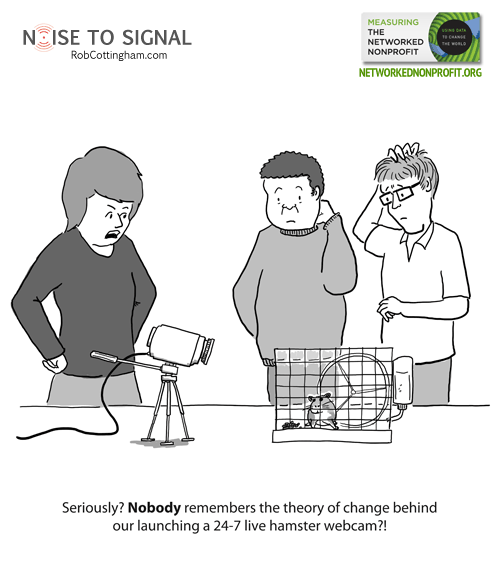Over the next several days, I’m posting cartoons I drew for Measuring the Networked Nonprofit: Using Data to Change the World, by Beth Kanter and Katie Delahaye Paine. I blogged about the book a while ago on Social Signal, explaining why I love it and why I think you should go buy a copy right now.
-< ºº>•
” “
(That little separator was intended to be a hamster. So now you know why my preferred drawing tool is a stylus and not a keyboard.)
Chapter 5 is titled “Don’t confuse activity with results,” which ought to cause us all some deep-seated soul-searching. It’s so easy to fall into patterns of behaviour, trot out the same shopworn tactics for campaign after campaign, and never ask the basic question, “Is this actually getting us anywhere?”
Katie and Beth say it’s time we held our activity accountable. (Giant puppets at protest rallies, tremble; you may have just heard your death knell.) And they recommend placing that activity in the context of a theory of change: a causal chain that begins with your tactics and ends – we hope! – with some measurable progress toward your goal.
A theory of change allows you to demonstrate the value of something like social media, where returns can be indirect and qualitative, resisting easy conversion to a dollar value – but which may be every bit as valuable as a cashier’s cheque. Beth and Katie (whom I may start calling “Kanter and Paine,” because it sounds like either a Broadway musical-writing duo or a don’t-f*ck-with-us law firm) prefer that to talking about ROI, an accounting term that often doesn’t capture the value in network- and relationship-building.
That’s an excellent reason to develop a theory of change. Here’s mine: it’s a powerful tool for motivating people, especially if they’re skeptical that what you’re asking them to do will have an impact. Your supporters, volunteers or staff may be asking “Why will this e-petition work when every other one I’ve signed had no impact?” or “I’ve never posted an online video before. Why should I believe it will make any difference?” A theory of change can be the story of just how their action will help to change things — and can inspire them to tweak their action for maximum impact.

